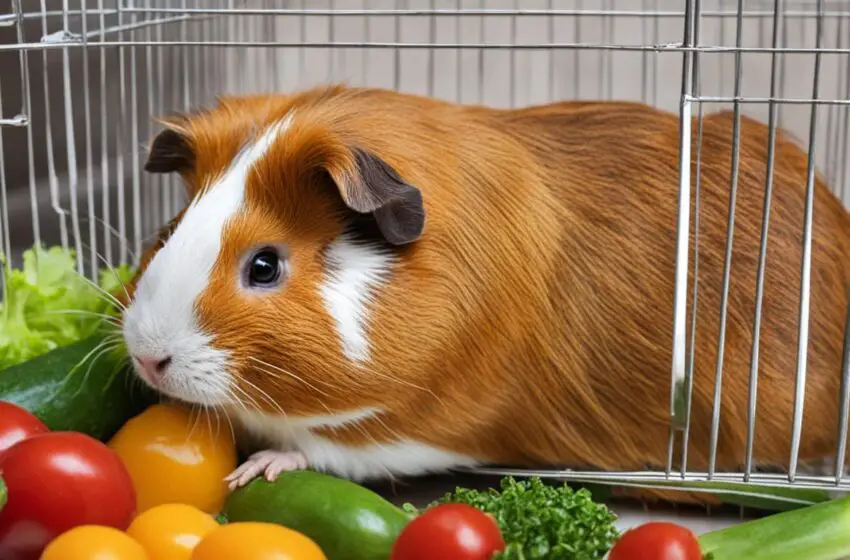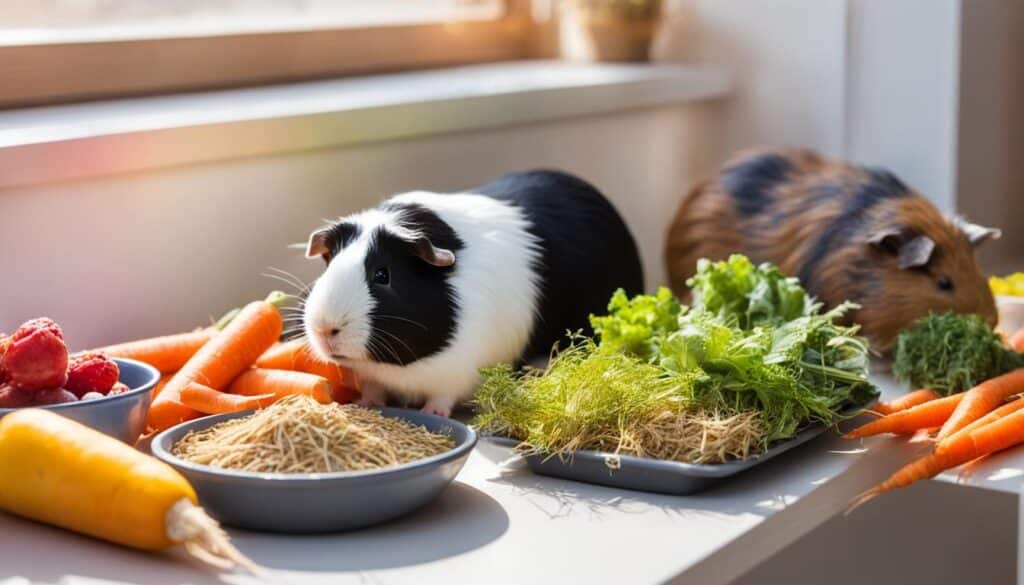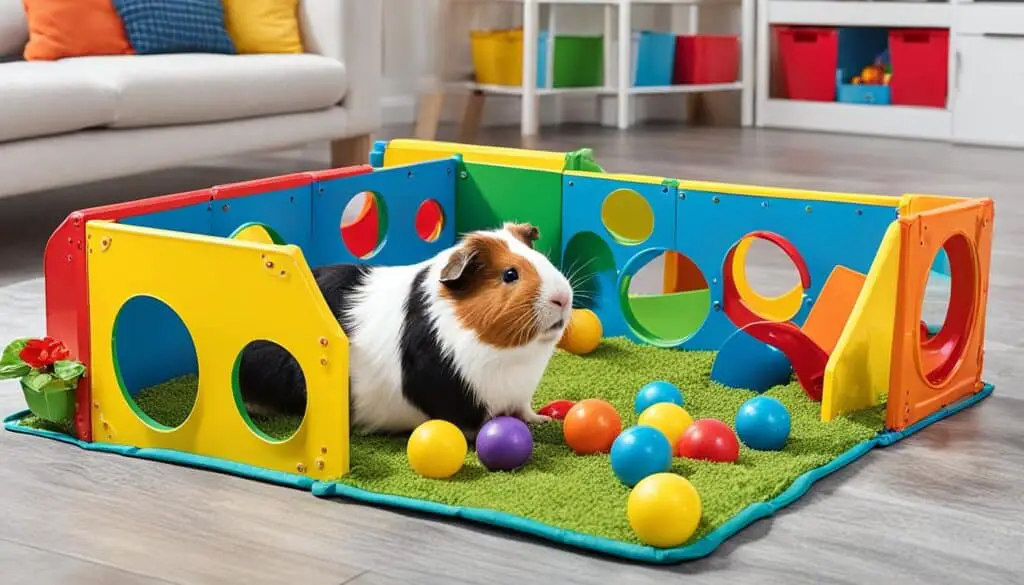Establishing a Healthy Daily Routine for Your Guinea Pig

When it comes to the well-being of our beloved guinea pigs, establishing a healthy daily routine is essential. This routine not only promotes their overall health but also contributes to their happiness and sense of security. By providing them with a regular schedule for feeding, exercise, socialization, and grooming, we can ensure that they have the best possible quality of life.
Creating a daily routine for your guinea pig involves careful planning and consideration. It is important to set aside time each day to attend to their needs and provide them with the care and attention they deserve. By doing so, you can create a harmonious and enriching environment for your furry friend, allowing them to thrive and flourish.
Key Takeaways:
- A healthy daily routine is crucial for the well-being of your guinea pig.
- Regular feeding, exercise, socialization, and grooming are the key elements of a healthy routine.
- Consult with a veterinarian for specific dietary and grooming recommendations.
- Provide your guinea pig with a clean and comfortable living environment.
- Spend quality time with your guinea pig to establish a bond and promote happiness.
Feeding Schedule for Your Guinea Pig
A proper feeding schedule is crucial for maintaining the health of your guinea pig. A well-balanced diet consisting of fresh vegetables, hay, and water is essential to meet their nutritional needs. Additionally, guinea pigs should have access to commercial guinea pig pellets as a source of additional nutrients.
Hay: Hay is an important part of a guinea pig’s diet. It not only provides the necessary fiber but also helps keep their teeth properly worn down. Ensure that fresh hay is always available to your guinea pig.
Commercial Guinea Pig Pellets: These pellets are specifically formulated to meet the nutritional requirements of guinea pigs. They provide essential vitamins and minerals necessary for their overall health. Feed your guinea pig a small portion of pellets daily as part of their diet.
Fresh Vegetables: Guinea pigs love fresh vegetables! Offer a variety of vegetables such as carrots, bell peppers, leafy greens, and broccoli. However, it’s important to introduce new vegetables gradually to avoid digestive upset. Remove any uneaten vegetables after a few hours to prevent spoilage.
Limited Amount of Fruits: While fruits are a tasty treat for guinea pigs, they should be given in moderation due to their high sugar content. Offer small amounts of fruits like strawberries, apples, or a slice of banana as an occasional treat.
Water: Fresh, clean water should be provided to your guinea pig at all times. Ensure that the water is changed daily to maintain its freshness.
Remember, sudden changes in your guinea pig’s diet can disrupt their digestive system. If you are unsure about any specific dietary requirements or have concerns about their feeding schedule, it’s always a good idea to consult with a veterinarian for personalized advice.

| Food | Quantity | Feeding Frequency |
|---|---|---|
| Fresh Hay | Unlimited | Available at all times |
| Commercial Guinea Pig Pellets | 1/8 cup | Once daily |
| Fresh Vegetables | 1/2 cup | Once daily |
| Limited Amount of Fruits | 1-2 small pieces | Occasional treat |
Exercise and Enrichment for Your Guinea Pig
Regular exercise and mental stimulation are crucial for keeping your guinea pig healthy and happy. Exercise allows them to burn off excess energy, maintain a healthy weight, and prevent boredom. Enrichment activities keep their minds active and engaged, providing a stimulating environment that promotes their overall well-being.
Providing your guinea pig with a spacious and secure cage or enclosure is the first step in promoting exercise and playtime. They need ample space to move around freely and explore their surroundings. Ensure the enclosure is escape-proof and free from any potential hazards.
Supervised playtime outside of their cage is an excellent way to provide additional exercise for your guinea pig. Choose a safe and enclosed area where they can explore and exercise under your watchful eye. Remember to gradually introduce them to this new environment to prevent stress or escape attempts.

Toys, tunnels, and hiding spots are essential to keep your guinea pig mentally stimulated. Provide them with a variety of toys to chew on, such as wooden blocks or safe chew sticks. Tunnels and hiding spots create opportunities for exploration and play. These enriching elements will keep your guinea pig engaged and prevent boredom.
Socialization is a vital aspect of your guinea pig’s well-being. They are social animals that thrive on human interaction. Take the time to handle and gently pet them daily. This will not only provide exercise but also help establish a bond and trust with your furry friend. Guinea pigs enjoy socializing with their human companions and benefit greatly from the positive interaction.
Grooming and Hygiene for Your Guinea Pig
Maintaining proper grooming and hygiene practices is essential for the well-being of your guinea pig. By implementing a regular grooming routine, you can ensure that your furry friend stays healthy and comfortable.
Brushing Their Fur
Regularly brushing your guinea pig’s fur is essential to prevent tangles and matting, especially for long-haired breeds. Gently comb through their fur using a soft brush or a special guinea pig comb. This not only keeps their coat clean and shiny but also helps distribute natural oils, keeping their skin moisturized.
Trimming Their Nails
Checking your guinea pig’s nails regularly is essential as overgrown nails can cause discomfort and even injury. Use small animal nail clippers or specialized guinea pig nail trimmers to trim their nails when necessary. Be cautious not to cut too close to the quick, which is the sensitive part of the nail that contains blood vessels and nerves.
Bathing, When Necessary
Guinea pigs generally do not require frequent bathing as they are naturally clean animals. However, there are situations when a bath may be necessary, such as if your guinea pig gets dirty or develops a skin condition. When bathing your guinea pig, use a mild shampoo specifically formulated for small animals and lukewarm water. Ensure thorough drying after the bath to prevent chilling.
Remember, excessive bathing can strip away natural oils from their skin, causing dryness and irritation. If you’re unsure about bathing your guinea pig, consult with a veterinarian for guidance.
Keeping Their Living Area Clean
Maintaining a clean living environment is crucial for your guinea pig’s hygiene and overall health. Spot clean their cage daily by removing any soiled bedding, droppings, or uneaten food. It’s also essential to perform a full cage cleaning at least once a week to prevent the buildup of bacteria and odors.
Here’s an example of a weekly cage cleaning schedule:
| Day | Task |
|---|---|
| Monday | Remove all bedding and wash the cage with mild soap and water |
| Tuesday | Replace bedding and clean water bottle and food dish |
| Wednesday | Spot clean cage by removing any soiled areas and waste |
| Thursday | Replace any soiled bedding with fresh bedding |
| Friday | Check and refill hay supply |
| Saturday & Sunday | Monitor cage cleanliness and make any necessary adjustments |
By following these grooming and hygiene practices, you can ensure that your guinea pig not only looks good but also stays healthy and happy.
Disclaimer: This image is for visual depiction and does not imply an endorsement of any specific grooming products or techniques.
Conclusion
Establishing a healthy daily routine for your guinea pig is crucial for their happiness and overall well-being. By incorporating key elements such as a well-balanced diet, regular exercise and enrichment, proper grooming, and a clean living environment, you can ensure that your furry friend lives their best life.
A well-balanced diet consisting of fresh hay, commercial guinea pig pellets, vegetables, and limited fruits provides the necessary nutrients for your guinea pig’s health. Regular exercise and enrichment activities, such as supervised playtime and interactive toys, keep them physically active and mentally stimulated.
Grooming and hygiene are important aspects of your guinea pig’s routine. Regular brushing of their fur prevents tangles and matting, while nail trimming keeps their nails at an appropriate length. Ensuring a clean living environment by spot cleaning daily and performing weekly cage cleanings promotes a healthy and hygienic space for your guinea pig to thrive.
Remember, consulting with a veterinarian is vital for personalized recommendations based on your guinea pig’s specific needs. By following these guidelines and incorporating them into your guinea pig’s daily routine, you can provide them with a happy and fulfilling life.
FAQ
Why is establishing a daily routine important for my guinea pig?
Establishing a daily routine is crucial for your guinea pig as it provides them with a sense of security and predictability, contributing to their happiness and reducing stress. It also helps maintain their overall health and well-being.
What should I include in my guinea pig’s feeding schedule?
Your guinea pig’s feeding schedule should include fresh hay accessible at all times, commercial guinea pig pellets, fresh vegetables, and a limited amount of fruits. Avoid sudden changes in their diet and consult with a veterinarian for specific dietary recommendations.
How can I ensure proper exercise and enrichment for my guinea pig?
Provide your guinea pig with a spacious and secure cage or enclosure where they can move around freely. Allow them supervised playtime outside of their cage with toys, tunnels, and hiding spots for mental stimulation. Socialize with them daily, as they are social animals that thrive with human interaction.
What grooming and hygiene practices should I follow for my guinea pig?
Regularly brush your guinea pig’s fur to prevent tangles and matting, paying extra attention to long-haired breeds. Check their nails regularly and trim them as needed. Guinea pigs generally do not require frequent bathing, but if necessary, use a mild shampoo formulated for small animals and ensure thorough drying.



